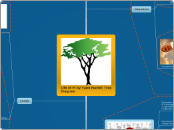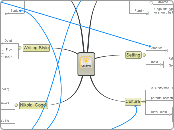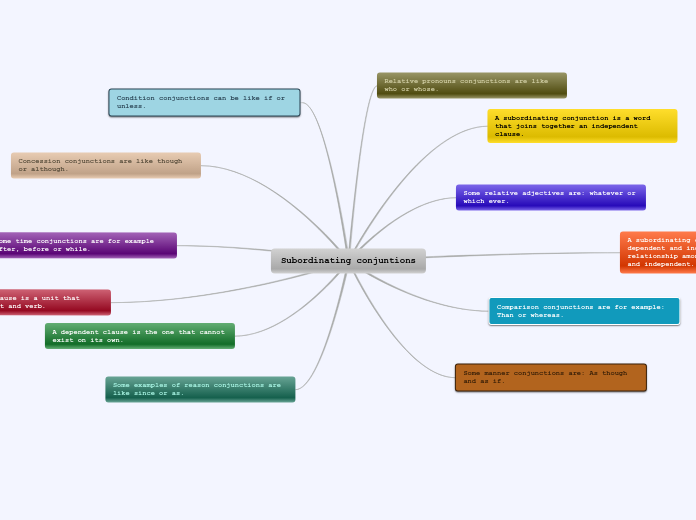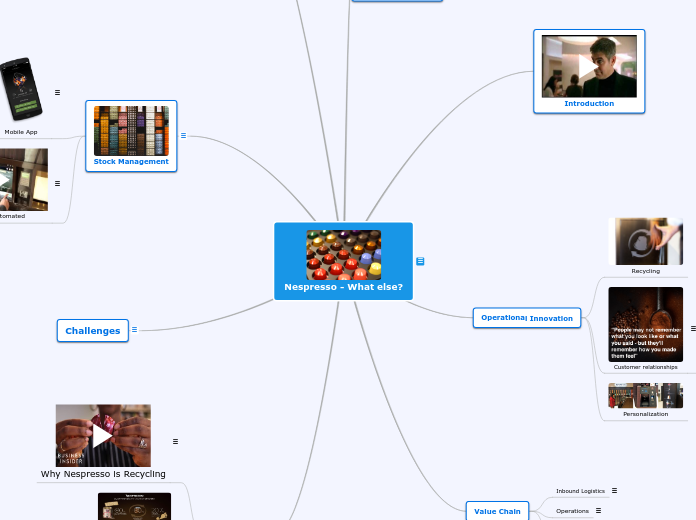Life of Pi by Yann Martel: Tree Diagram
Analyis
Themes
Fear
"I must say a word about fear. It is life's only true opponent. Only fear can defeat life. It is a treacherous, clever, adversary, how well I know. It has no decency, respects no law or convention, shows no mercy. It goes for your weakest spot, which it finds with unerring ease. It begins in your mind, always." (Martel, 178-9)
Storytelling
Changing the characters for Pi's own sanity. Not wanting to accept how cruel humans (and himself) can be when necessary, so changing the humans to animals with human characteristics.
Trusting the narrator: Validity of Pi's story? The real truth in the story that Pi tells to the Japanese officials?
Narration: 1st person story within a story. Told by Pi from middle age in Canada
Man vs Nature and Man Co-Existing with Nature
"Getting animals used to the presence of humans is at the heart of the art and science of zookeeping. (Martel, 49). Pi's first encounter with a dangerous and hungry Richard Parker compared to Pi's experience on the lifeboat with a co-existing Richard Parker.
Religion
Freedom
"I don't mean to defend zoo's. Close them all down if you want (and let's hope that wildlife remains can survive in what is left of the natural world). I know zoos are no longer in people's good graces. Religion faces the same problem. Certain illusions about freedom plague them both." (Martel, 16). Is freedom the ability to make choices, or is it the ability to live without having to make them? Furthermore, is the ability to choose your own life regardless of the outcome enough to be considered freedom?
Survival
Mortality
Throughout the novel, Pi works to survive on the lifeboat with Richard Parker. Pi also mixes his feelings on death with his feelings about mortality and religion. "My life is like a memento mori painting from European Art: there is always a grinning skull at my side to remind me of the folly of human ambition. I mock this skull. I look at it and I say, "you've got the wrong fellow. You may not believe in life, but I don't believe in death. Move on!" (Martel, 6)
Symbols
Orange: Orange colors many symbols of hope throughout the novel. Richard Parker is orange, the lifeboat is orange, and Orange juice is orange. All of these give Pi hope in different and signigficant ways.
Pi's name: Pi is a greek letter combination of Alpha (dominant) and omega (submissive). Relationships between the two can be seen in the balance of dependence seen in the relationship between Pi and Richard Parker.
Context
Setting
Land
The floating carnivorous island that is also a dichotomy of life and death
Lifeboat lands in Mexico after days lost in the Pacific Ocean
Political unrest concerning the Indian government causes Pi's family to move from India to Canada. Pi's father chooses to move the zoo with them as well, and they board a Japanese carrier to take them to their new home
Pondicherry, India 1977
Water
Water is what moves Richard Parker and Pi througout the water. Their will to stay out of it is also a factor in their need and desire to co-exist.
The taking and giving of life: Shipwreck and danger in the water (taking) and fish/floating island to feed Richard Parker and Pi (giving)
Ship sinks in the middle of the Pacific Ocean
Patel family moving their zoo to Canada by ship
Main topic
Critical Questions
What is true in Pi's story, and what is not? What is the reasoning for this?
Recounting of the story in Benito Muarez infirmary to Okamoto and Chiba
Story from first person point of view
Are each of the animals on the lifeboat people? Pi as Richard Parker, Orange Juice as Pi's mother, the zebra as the sailor, and the hyena as the cook?
Is Pi closer to an animal on the lifeboat, or is Richard Parker closer to human? Are they the same person?
Pi not being able to rationalize the cruelties humans are capable of and changing humans to animals
Relationships between humans and animals. What helps Pi and Richard Parker to co-exist? What does their relationship say about themes of the novel and the author's purpose?
water, survival, identity confusion?
How does Pi's dedication to belief and religion change throughout the novel?
What Pi is capable of (both good and bad).
What humans and animals are capable of (both good and bad).
Distinctions between fact and imagination: Emphasized in Pi's description of the atheist death "...Possibly a f-f-failing oxygenation to the b-b-brain" and, to the very end, lack imagination and miss the better story." (Martel, 64)
Where is the realness in illusion?
Pi's interaction with teacher Mr. Kumar
Characters
Comparisons between Pi and Richard Parker
Distance
Pi and Richard Parker keep their distance even on a small boat allowing them to co-exist peacefully. This suggests that they are both dependent on each other: Pi is dependent on Richard as a symbol of hope, life, and as a distraction, and Richard Parker is depedent on Pi for food and water.
Naming
Pi (originally Piscine) changes his name to Pi because of a clerical error in the way his classmates pronounced his name as "pissing".
Richard Parker assumed the name of his hunter by mistake while hunter Richard Parker accidentally recorded himself as "Thirsty":the original name for the tiger. In this, the human and animal switch places like Pi and tiger Richard Parker do.
Identity
Pi's story to the Japanese Officials after he lands in Mexico is Pi revealing himself as Richard Parker to make the story "more believable". This also presents the question of the validity of Pi's storytelling.
Part 3 of the novel: Indentity between Richard Parker and Pi becomes difficult to distinguish
Animal/Human Instincts
Pi's transition from vowed vegetarian to surviving carnivore (and cannibal) like Richard Parker
Richard Parker
Adult male Bengal Tiger
Relationship with Pi: Dependence and blending of identities
Silence and Sulking: Richard Parker takes on the human characteristic of sulking under the taraupin in part 1 mainly, and with the exception of only a few minor growls is silent throughout the novel. Becuase of this, Richard's identity is made from his physical and animalistic actions.
Named after the human hunter Richard Parker because of a clerical error
Saves Pi's life by killing hyena and keeping Pi alert for the duration of their time in the Pacific
Pi Molitor Patel
Middle Aged man telling the events from when he was 16
Son of a Zookeeper: Pi grew up with his mother, father, and brother living in an Indian zoo. During this time, Pi learned about the animalistic and personfied trairs of many animals (including Richard Parker). From an early age, Pi talks about the capabilities of many animals, and thinks of them with complexity and sentiment.
Renames himself Pi after his classmates fail to correcty pronounce his full name Piscine.
Loses his family in the Pacific Ocean
Hindu, Muslim, Christian









